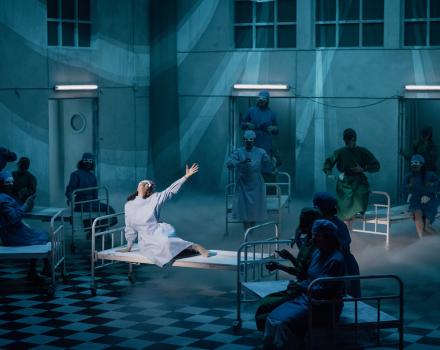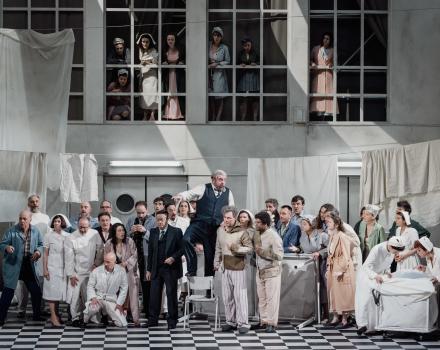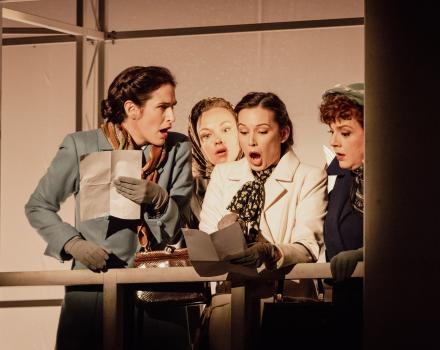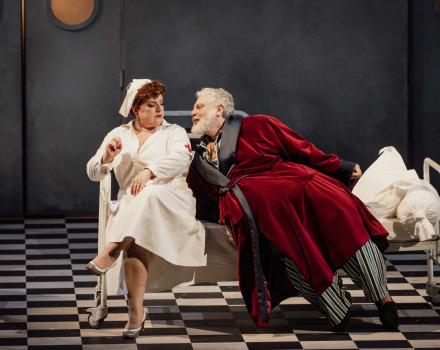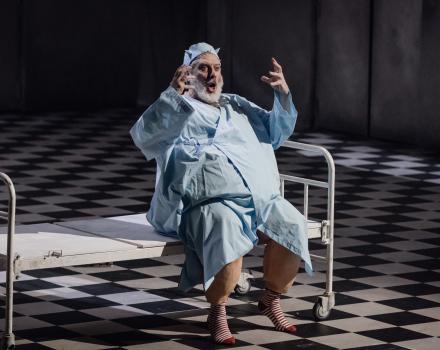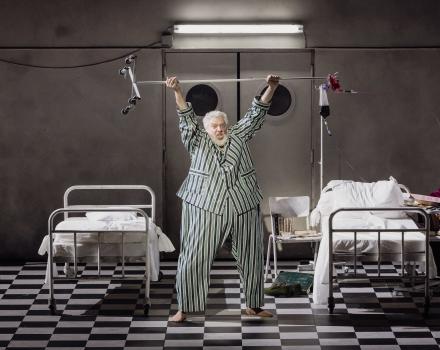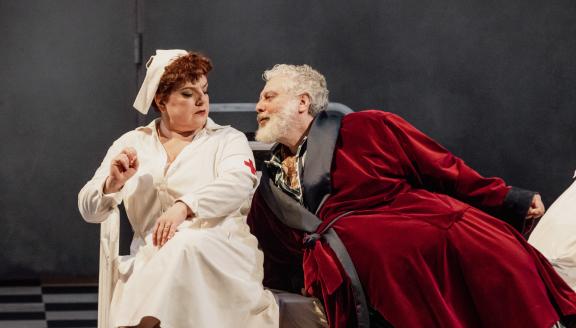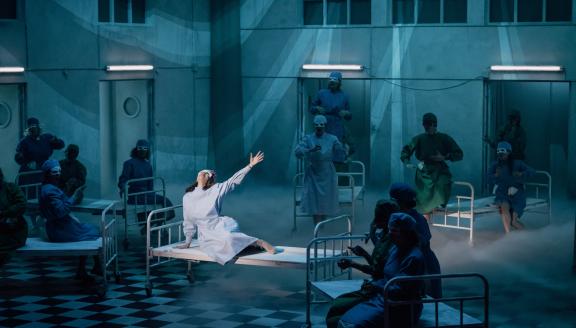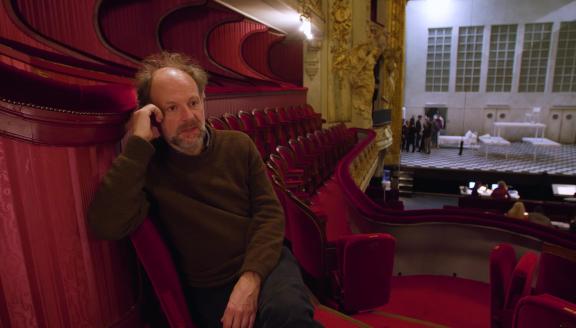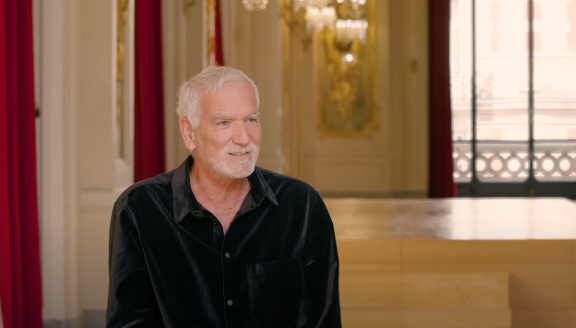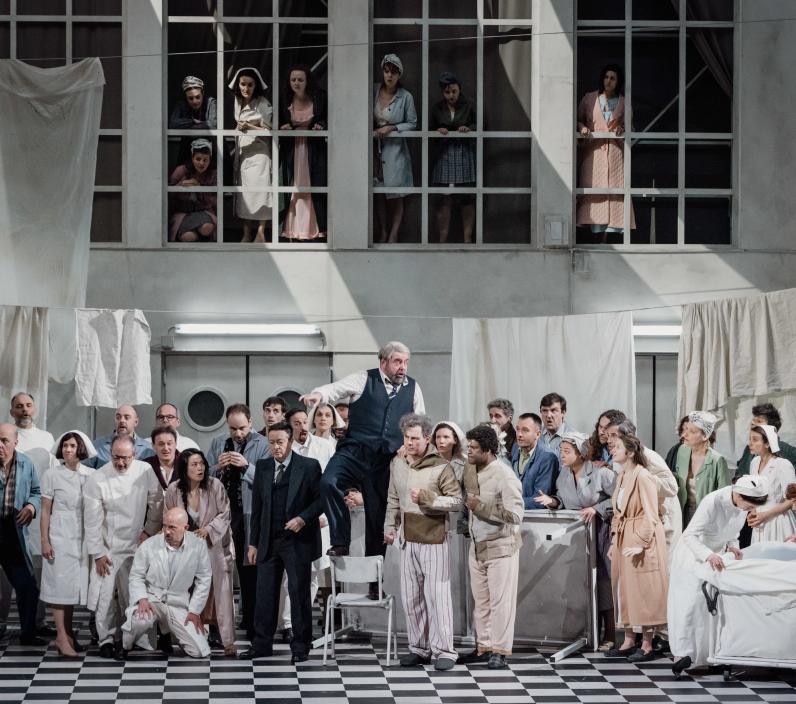
The lecherous Falstaff, with his infamous roving eye, finally meets his match when his underhand plans to solve money troubles have the three merry wives of Windsor conspiring to teach him a lesson.
Verdi was already in his eighties with a successful career behind him when he wrote Falstaff. After Otello and Macbeth, the composer went back to Shakespeare, this time for a comedy about the grotesque figure of Falstaff. A drunkard, womaniser, troublemaker and glutton, Falstaff is also capable of tenderness and dejection. It is this endearing and complex character - so human in his excesses and demise - that director Denis Podalydès conjures up in the inspired setting of a run-down hospital designed by Eric Ruf. This musical masterpiece, in which the orchestra plays a particularly important role, is conducted by Antonello Allemandi. Clad in costumes by Christian Lacroix, the cast of excellent singers work as an ensemble to bring these colourful characters to life.
Cast
Falstaff | Tassis Christoyannis |
|---|---|
Alice Ford | Gabrielle Philiponet |
Meg Page | Julie Robard-Gendre |
Mrs. Quickly | Silvia Beltrami |
Nannetta | Clara Guillon |
Ford | Gezim Myshketa |
Fenton | Kevin Amiel |
Dr. Caius | Luca Lombardo |
Bardolfo | Loïc Félix |
Pistola | Damien Pass |
Comedians | Laurent Podalydès Léo Reynaud |
Orchestra | Orchestre National de Lille |
Chorus | Choeur de l'Opéra de Lille |
| ... | |
Music | Giuseppe Verdi |
|---|---|
Text | Arrigo Boito |
Conductor | Antonello Allemandi |
Director | Denis Podalydès |
Associate Director | Laurent Delvert |
Sets | Éric Ruf |
Costumes | Christian Lacroix |
Lighting | Bertrand Couderc |
Hair and Make-Up | Véronique Soulier Nguyen |
Chorus Master | Mathieu Romano |
Singing coach | Nicolas Chesneau |
Scenography assistants | Julie Camus Zoé Pautet |
Assistant choreographer | Cécile Bon |
| ... | |
New production by Opéra de Lille. Coproduction with Théâtres de la Ville de Luxembourg and Théâtre de Caen.
Videos
Story
Act I
Doctor Caius has come to complain to Sir John Falstaff that Bardolfo and Pistola, Falstaff's unruly companions, have made him drunk and robbed him. They laugh at him until he leaves the inn in a fury. The landlord presents a bill and it becomes clear that Falstaff is chronically short of funds. He reveals a masterplan to remedy the situation by seducing two women, Alice Ford and Meg Page, the wives of wealthy Windsor gentlemen. When Bardolfo and Pistola refuse to be part of his plans, Falstaff is outraged by their trumped-up excuses and throws them out.
Alice and Meg discover that they have received identical love letters from Falstaff and decide to teach him a lesson. Mistress Quickly agrees to help them by luring him to a rendezvous. In the meantime, Bardolfo and Pistola have told Ford of Falstaff's plans, in the hope of financial recompense. Ford decides to test his wife's virtue by visiting Falstaff in disguise and pretending to ask his assistance in seducing her. His daughter, Nannetta, and her lover, Fenton, snatch illicit kisses whenever they find the opportunity.
Act II
Bardolfo and Pistola beg to be allowed to return to Falstaff's service. Mistress Quickly comes to give Falstaff replies from both Meg and Alice, inviting him to visit Alice later that day. Matters appear to be proceeding even more satisfactorily when Falstaff is offered cash by a stranger calling himself Brook (he is in fact Ford in disguise) to soften up Alice for him by seducing her. Falstaff agrees with alacrity and, while he prepares for amorous conquest, Ford rages against his wife and her suspected infidelity.
Nannetta bewails the fact that her father is trying to marry her off to Doctor Caius. Alice reassures her and, with Meg and Mistress Quickly, makes preparations to receive Falstaff. They plan to pretend that her husband has returned home unexpectedly and force him to hide in a laundry basket. All goes according to plan until Quickly announces that Ford is really on his way home, determined to surprise Falstaff with his unfaithful wife. In the ensuing chaos, Falstaff and the dirty laundry are tipped into the River Thames and the only lovers to be discovered are Nannetta and Fenton. Ford is forced to admit that he was wrong to suspect Alice.
Act III
Falstaff rails against the injustice of his treatment and Mistress Quickly has some difficulty in persuading him to succumb to a second invitation from Alice. Eventually he agrees to meet her that night in Windsor Forest where, according to local legend, witches gather and the ghost of Herne the Huntsman is sometimes seen. Quickly advises him to scare off anyone who might see him by adopting the guise of Herne the Huntsman, wearing stag's antlers on his head. Falstaff is unaware that everyone in Windsor is planning to trick him and that they all intend to be in the Forest that night, wearing various disguises. Ford revels in the prospect of getting his own back on Falstaff and is also determined to force his daughter to marry Doctor Caius. Mistress Quickly overhears him and works out a way of tricking him as well, by dressing someone else in Nannetta's costume as Queen of the Fairies.
As midnight approaches, people begin to gather in the Forest. Falstaff appears and makes strenuous efforts to seduce Alice. As supernatural noises are heard in the distance she runs away, leaving Falstaff to be tormented by disguised townspeople. It is only when he recognises Bardolfo's flaming red nose that the trick is uncovered. Ford mocks Falstaff and then gives his blessing to the union of two couples, assuming one pair to be Caius and Nannetta. When they take off their disguises he finds that he has approved Nannetta's marriage to Fenton and that Doctor Caius has been joined to Bardolfo. The women delight in their triumph over the men's suspicions and vanities and Falstaff leads everyone in a final burst of laughter.
INSIGHTS
The Wayward Falstaff
Director’s note by Denis Podalydès
The Shakespearean Falstaff, a man ‘larger than life’
Long before I saw the opera, I saw Orson Welles' film Falstaff, in which he himself played the title role. For me, Welles and Falstaff are synonymous. Welles, as sensitive to Sir John’s poetry and depth as to his truculence, never makes Falstaff into a ridiculous character. Falstaff is a man ‘larger than life,’ he used to say, going beyond and above all categories, laws, morals, religion, honour. Nothing limits or checks him, he neither limits nor checks himself. Nothing can reach right around his girth, which is also his Achilles heel, as it were. The stomach is both a sign of generosity and weakness, of power and disease: it’s truth, greatness, singularity. It’s servitude and pain. Grace and greed, art and artichokes. Falstaff is a lord of marvellous elegance, full of humour and melancholy, verve and suffering. His naivety is full of intelligence: he would rather risk ridicule and rejection than miss a woman, rather than not look at her, try to win her over, one last time, because he is no spring chicken. The focal point of all the mockery, he has no idea of the evil that people may wish him, of the ironic and cruel way they look at him, or even of the disgust he may inspire.
Societies adore and then sacrifice this kind of character. The lynching to which he is subjected in Shakespeare's play (The Merry Wives of Windsor) and in the opera is staggering. Twice Falstaff is fooled, humiliated, molested, almost murdered. The first time, he is suffocated and drowned. The second time, he is larded and skewered. The bull becomes bambi; the predator a pitiful prey. We could see Falstaff as an oaf, a Harvey Weinstein, a crass seducer, full of smugness, money and cynicism, avenged by his victims Alice, Meg and Quickly. But that's not all: Falstaff is poor, impotent and irresistibly sympathetic. And death is just around the corner. The opera is more mysterious than its farcical framework.
A fight for life
Verdi's last opera is a dramatic construction of extreme virtuosity and immense, dazzling beauty. You barely have time to take in the splendour of one passage before you're plunged into the next, and as quickly onto something else again. Everything is movement, acceleration, deceleration, change of rhythm, metamorphosis. Verdi's energy and vitality are astonishing, larger than life. Falstaff's enormous midriff is less a matter of grotesque exaggeration than of an inexorable movement towards an explosive end. Boito's libretto is filled with every possible synonym for a big belly. At the age of 80, Verdi had thought for a long time about King Lear, which he wanted to turn into an opera. He didn't but Falstaff is not far from Lear. He too has lost his kingdom, his power and his loves. He too is swept up in the storm, humiliated and beaten. I can't imagine that Verdi didn't have his own end far from his thoughts.
A place of humanity
We're staging the opera in an old hospital; comedy in a place of illness and death. One of those long-stay institutions, somewhere between an asylum and a sanatorium, far removed from the world. Paradoxically, life there is rich and sometimes joyful. There are many stories to be told between the long-haul patients and the hospital staff; doctors and nurses deal with the patients; alcohol, money and smuggled drugs are passed around. The places are named in a code, known to the patients or invented by them. The Garter is the common room, Windsor Wood, the block, and so on. Falstaff is just another sick man, perhaps even more seriously ill than others, and his weight is also a form of death sentence. The women he falls in love with and the ones who are going to have the last laugh are the nurses. Caius is a doctor, of course, but Ford is also a pharmacist and steward. Bardolfo and Pistola are on the same ward.
The question of women also features prominently in this opera. Because he believes himself to be desirable, the women's view of Falstaff, the object of derision, is merciless. The cruelty of Meg, Alice, Quickly and Nannetta towards the dominant male is also a sign of their liberation and emancipation.
Ambivalence in the opera
If you only focus on the farce, the cruelty of the libretto is unnecessary and unpleasant. The opera begins and leaps straight into the story without any preamble; you are swept along as if magicked on to a ghost train going full tilt. It's funny, eventful, varied and lively. Falstaff appears to us in the middle of an anecdotal drinking dispute, which he settles like a disdainful king ordering his court about. Then a Wagnerian motif allows us to broaden our understanding of the character; comedy and humour are a constant, but we are aware of nobility and poetry. Laughter leads to seriousness and seriousness leads to laughter. The forest, the stroke of midnight, Falstaff's anguish, the fairies, Nannetta's aria, then the long sequence of lacerations, right up to the fugue, all take us beyond comedy entertainment, as Shakespeare did in A Midsummer Night's Dream, The Winter's Tale and The Tempest. All great works of art, including comedies, are ambivalent; we laugh because there is a serious, dark and tragic background, just as, conversely, all great tragic works make us laugh, at least in Shakespeare's case. ‘E sogno o realta’ (is it a dream or reality?); Ford's question can be understood as a generic one.
Gallery
